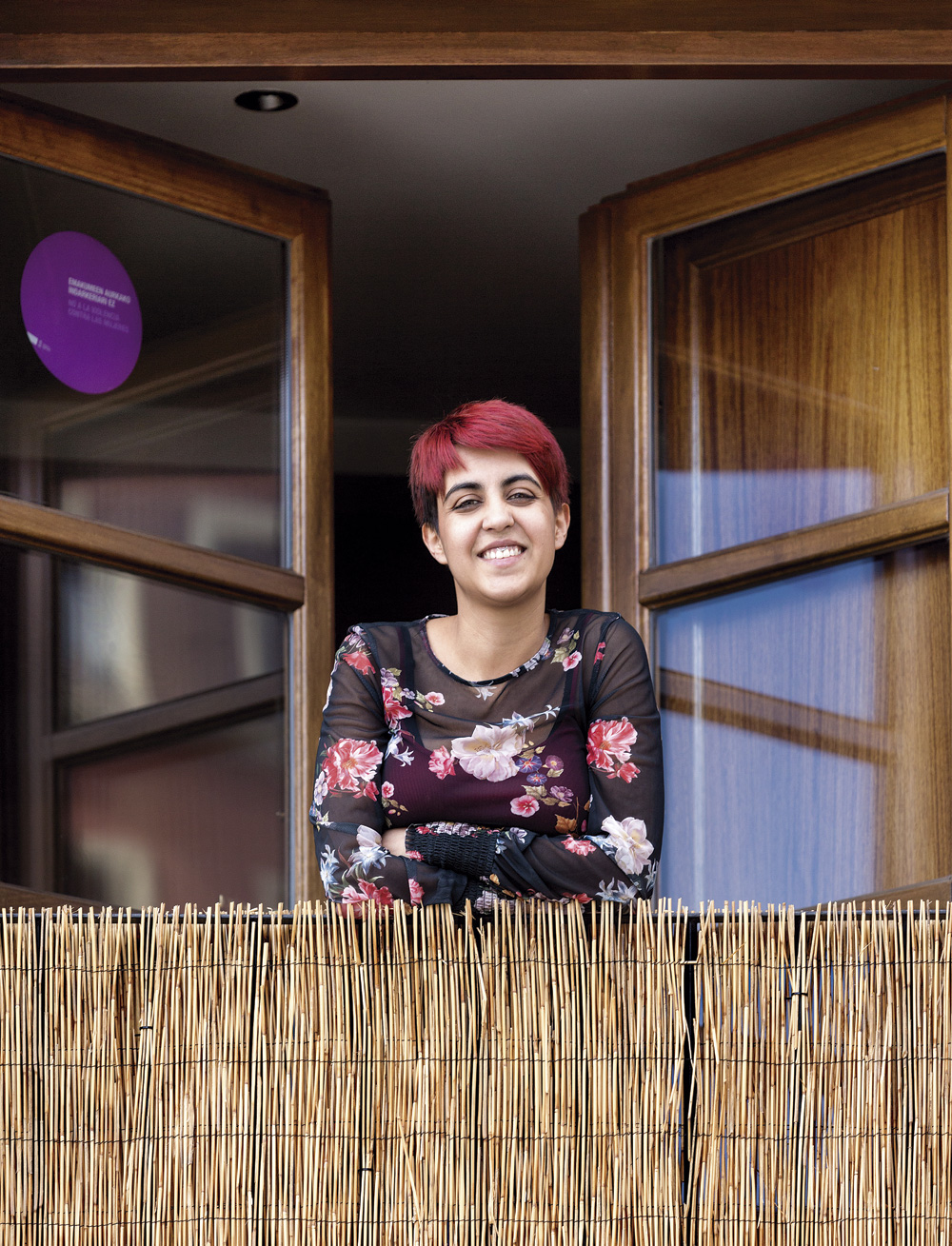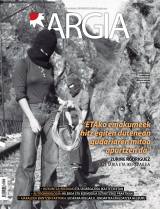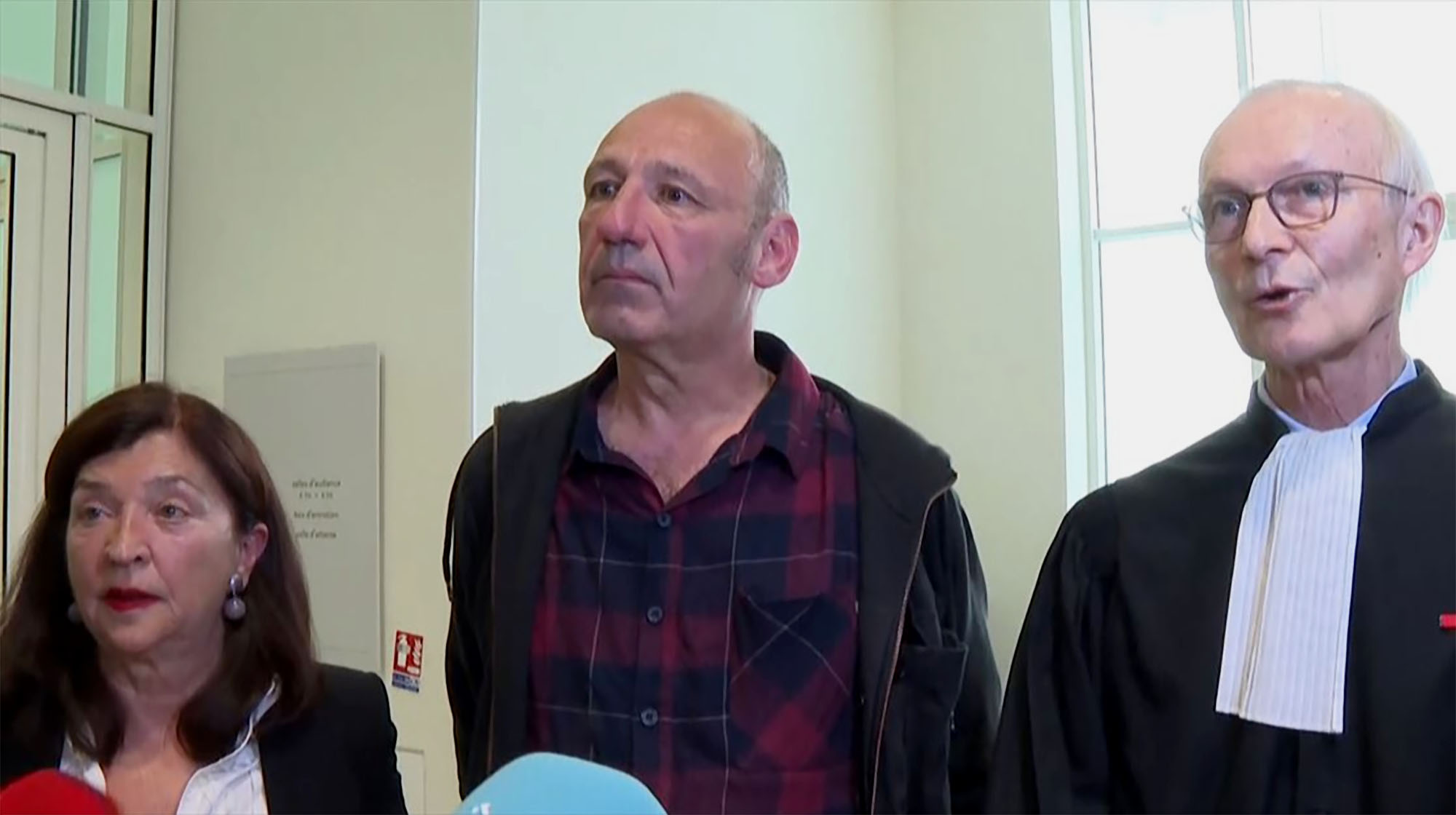"The feminist movement must participate in the peace process"
- Journalist Zuriñe Rodríguez has always been interested in the role of women in armed conflicts, but she has always realized that it is easier to analyze remote knots than her own. However, it was then that ETA announced the definitive cessation of armed activity. And that's how Rodríguez began to study it, that's ours.

Kazetaria eta ikertzailea. Hainbat komunikabidetan eta unibertsitatean jardun da. Gaur egun, ordea, Sudergintza ikerketa-kooperatibako kidea da, Nora Miralles eta Itziar Mujikarekin batera. Gatazka, bakea eta memoria lantzen dituzte, eta horrekin lotutako gaitze-prozesuak egiten dituzte, emakume helduekin batez ere. Adibidez, aurtengo martxoaren 3ko prozesua haiek landu dute, eta aurki kaleratuko dute horri buruzko liburua. Aurrez beste liburu bat publikatu du Rodriguezek: Borroka armatua eta kartzelak (Susa, 2016), Oihana Etxebarrietarekin lau eskutara idatzia.
The first thing he did was investigate how ETA women have been portrayed in the media.
It is clear that the constitutionalist media have had a misogynistic attitude towards the militant women of ETA, but I intuited that the Basque media would also have such attitudes, both progressive and conservative. I started studying it.
How long have you studied? And what conclusions do we draw?
I took into account the whole story of ETA. The main conclusion is as follows: When the Spanish Ministry of the Interior created the ZEN Plan [Northern Special Area], in 1983 media policies were modified, in both cases in the constitutionalist media and in the Basque Country's opening media. The ZEN Plan includes a small section containing recommendations for the media. And there it is said that you have to look at the bad and weird customs of the ETA militants. This served to talk about women in the media.
What had changed?
Conservative constitutionalist media (ABC, El Mundo y La Razón) and progressive media (El País) begin to use pure misogyny. For example, they wrote that a particular militant poured blood for the pistol (ABC) as for a grain. On the other hand, the non-conservative constitutionalist media transformed militant women into monsters. Insects are not mentioned, but they are presented as bloodthirsty terrorists. Thus emerged, for example, the myth of Idoia López Riaño.
What about Euskal Herria?
Conservative media (Deia) took the path of progressive Spanish media: blood, monster… There is no trace of femininity, except in some cases. On the contrary, the progressive media, especially Egin and Gara, mystified the militants, but this glorification had to do with motherhood in particular. In this sense, it was a disactivist and essentialist reading. In addition, although unconsciously, the pseudonyms that Spain has invented were also reproduced, as in the case of López Riaño, for example.
He has also closely analyzed the case of another woman who was a ETA militant: Dolores González Katarain Yoyes.
I took the cases of González Katarain and López Riaño, because they have been talked more communicatively, and because they are from two eras. Yoyes, prior to the Zen plan, and López Riaño, subsequent to ETA.
I studied the murder of Yoyes and the 30th anniversary of her death, and I saw that conservative constitutionalist media pardoned this woman's militancy: they didn't present her as a militant and former terrorist, but as murdered by ETA. Over time, however, they emphasized motherhood. During the murder, the constitutionalist media said: The leader of ETA has been killed. However, 30 years later, he is believed to have been murdered as a mother. Thus, it is seen that these media forgave him not for his political decision, but for being a mother, because he returned “to the place that had to return”. And why do I say this? Well, with López Riaño, just the opposite. Despite the fact that he has also left ETA, the conservative media treats him as a former terrorist and continues to write eleven articles about his appearance.
In 2016, it marks the 30th anniversary of the assassination of Yoyes. How do we live here?
I think it's our taboo. We've talked very little about it, and in the feminist movement, we haven't talked yet. Yoyes had a day to day, and there are many reflections about feminism. I think it is time to open the melon.
After analyzing media representations, you started meeting with women.
The study of the media was very lonely and had a border. It seemed to me that I should take one more step.

What time have you met with women? How many?
At first I wanted to take the whole story of ETA, but it was difficult for several reasons (mass arrests, jail, fear, stigma…). I interviewed from the creation of ETA (1956) to the dissolution of military policy (1982). I took that date because a woman read the statement when ETApm was dissolved and I found it symbolically nice. On the other hand, many were dead, and it was urgent to meet them.
I've been with 28 women. I decided not to judge who was an ETA member and who was not; I would ask them. Why? Because I saw that a lot of women couldn't get into ETA because they had difficulties, so if a woman told me that she wanted to tell me her experience, that she hadn't been to ETA but that she had made an effort to get into ETA and had problems with it, I would have recognized her. Then, I classified two profiles: on the one hand, ETA women and on the other, those who were members of the support network, not in the sense that the Spanish State understands as a support network, but as it understands feminism. It seemed necessary to me to study how emotions, food and that intention were sustained, which is not considered political in general.
What has been the way?
Very difficult… Some of the women I have interviewed have been amnestied in their day, and others have already served their sentence, so many were not afraid of police consequences. In any case, it was not the case for everyone, as it was dangerous for some to tell their experience. So we've used pseudonyms. Apart from that, I've found a lot of personal and emotional problems. Some could not speak for the stigma of the people, or if they told their story, they knew who they were in the village. That's one conclusion: there's still a lot of stigma. It's hard to talk about a few things; after all, when women talk, you break the gudari myth. I always asked them if there was anything they didn't want to mention, that they would say it calmly and that I wouldn't ask for it. I thought that torture, repression… But there was often love, broken couples, child management… Many times those things that have to do directly with patriarchy were an obstacle.
On the other hand, I have encountered great difficulties on the part of patriotic men. Many times I was told that I was not the right person to investigate, and I got a thousand obstacles: vetoing in assemblies, denying writings for academic books… I’m clear why they’ve done it, because they don’t like my feminist view. Pure misogyny. I have at my side some of my colleagues who are investigating ETA, whether they are men and young people, and they have not received vetoes of any kind.
I want to bring here a question that you asked yourself in your day: Why did these women decide to join ETA?
We've been told that many women entered ETA because their partner was there, but I've seen that's not the case: all the women I've interviewed, except one, had political-ideological motivations, common motivations, like men. To fight for an independent Basque Country, to fight against Franco… And there are concrete reasons that women mentioned and not men – because I have also interviewed men, ten – for example, the emotional impact of a tragic event (the fact of having killed or tortured someone nearby), and women’s referents (the Burgos process had a great influence in this sense, because they judged three women: Itziar Aizpurua, Arantza Arruti and Jone Dorronsoro). In addition, women who identify as feminists tell me: “I entered the terrorist in order not to be a housewife.” These women had received a terrible slap, because the liberation movements are not so free, but they wanted to move away from the people and from the rules.
“Now there are no victims of ETA, but women are also political victims”
Let's go back to the present. How do you see the peace process in the Basque Country?
It's hard. Having regard to the peace process and bearing in mind that the immobilism of the Spanish State has led us to agree other formulae, I believe that this can provide a great opportunity for the subjects we are at the base or at the margin to participate in the peace process, but that process is not taking place in this way. Some attempts are being made, but more needs to be done. In view of the photos of Aiete or of disarmament, it is clear that men are at the forefront of this process. I think that is what is happening because men have fought and therefore want to make peace themselves, and in that sense I believe that we need to question mainly left-wing men, but also the feminist movement. The feminist movement in general is not in favour of making a critical reading of the conflict. There are collectives that are dedicated to it, like Bilgune Feminist, and there are satellites, but in general the feminist movement is not working, and I am very afraid of it, because I believe that we are dealing with a process of patriarchal peace.
Why should the feminist movement participate in the peace process?
Because he's an agent of Euskal Herria, there's no more. We cannot call the majority unions, the social partners, the non-governmental organisations… and the feminist movement no. I believe that the feminist movement gives a complete reading of violence, and what has happened in Euskal Herria if it is not a situation of violence? On the other hand, how many women have been killed since ETA abandoned the armed struggle? There are now no victims of ETA, but women are also political victims. Women, Ekai [the transsexual young man who has committed suicide]… are political deaths, we still have victims, but we have not left and said that we live in war in this society. In Euskal Herria we are building our peace process, let us seize this opportunity.
Finally, and above all, I want to throw three hooks at you. One: April 9, 2016, national rally Feministok prest, why in Gasteiz?
They always ask us why we did it in Vitoria and we always get angry and respond. Why not? It was a manifestation organized by the feminist movement of the Basque Country, not by the feminist movement of Gipuzkoa or Bizkaia, and Vitoria-Gasteiz is Euskal Herria.
In the summer of 2015, a process of criminalization took place in Vitoria-Gasteiz [the feminist movement made an action to denounce the aggressions suffered by women in public spaces, after which the representative of the Commission of Blusas and Neskas filed a complaint with two militants]. There was a general need for a demonstration. The Alaveses took advantage of it and we set out to do it there. And we have to say that it raised many doubts inside, and that there was a certain paternalism outside (in the media) and inside. We speak in the feminist movement of peripheral and out-of-the-box bodies and discourses, because we need a critical debate about territoriality.
Two: Basque.
I studied in Spanish at school, that's my first language, and learning Basque has been a militancy, a political choice. As we say we are political boycotts, I am a Basque politician. It is not born, it is done, from a position in addition. It is true that the people who have Euskera as the first language suffer discrimination, and there are many, but that is the experience of a single Euskaldun subject, especially the white Gipuzkoan subject. I think we have to broaden the subject. In Vitoria-Gasteiz very nice processes are taking place with the Basque Country, the number of people who speak Basque has increased considerably. It is not problematic that Euskera is the second language, because we believe that the first language is Spanish, but my neighbour Muhammed, for example, has Arabic as the first language and with me always speaks in Basque.
Three: research at university and outside it.
It is difficult to research at the university because the university has been subjected to totally insane international standards. I felt utterly absurd when I published in a Dutch magazine an incredibly academic article on the conflict in the Basque Country, without bringing it here. I like social research. I do things about conflict and memory, and I need to do things calmly, not meet 28 women in two years to talk about very painful things, because academia asks you to. The Academy is far from reality and things that happen in the people, and it is precarious. The workers are very ill. In addition, there's a very powerful left patriarchy and it's very difficult to be a critical feminist woman. So I decided to investigate from the outside.























